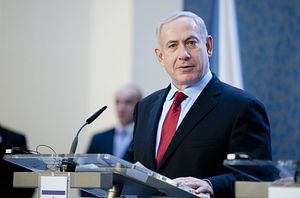Organized behind the back of the Obama administration, Israeli Prime Minister Benjamin Netanyahu’s March 3 speech in front of the Republican-dominated Congress has arguably exerted a polarizing effect on how the U.S. will act during the ongoing nuclear talks with Iran. The unconventional letter by a group of 47 Republican Senators — who bypassed the White House to directly address Iranian leaders about the constitutional powers of the legislature — was the most explicit example of such an effect. Any deal on “your nuclear-weapons program that is not approved by the Congress,” the letter reads, will be considered as “nothing more than an executive agreement between President Obama and Ayatollah Khamenei” which could thus be repealed “with the stroke of a pen.”
Ironically, however, Netanyahu’s spoiler attempt has also set in motion a parallel political-psychological dynamic, both in Washington and Tehran that is actually helping facilitate negotiations toward a feasible settlement. Both the Obama administration and the Iranian leadership, including President Hassan Rouhani, now feel that any potential failure to clinch a deal will be largely attributed to Netanyahu’s last-ditch “heroic feat”, rather than to irresolvable differences between the negotiating parties.
On the U.S. side, Obama does not want to go down in American history as a weak leader, who buckled under the pressure of a foreign prime minister and had to submit to the demands of a “junior partner” at the end of his two-term presidency. With this in mind, it is no surprise that Obama has been exceptionally quick to respond to Netanyahu’s congressional address.
“I did not have a chance to watch Prime Minister Netanyahu’s speech,” he said shortly after the talk was given. Obama further downplayed the speech as featuring “nothing new” and offering no “viable alternatives” to a negotiated agreement. In a thinly veiled attempt to confront critics with a sort of fait accompli, he had suggested, only a day before the speech, a verifiable suspension of Iran’s nuclear program for at least 10 years as a prerequisite to a final deal. Notably, in a rare yet calculated interview a few days later, Obama cited “progress in narrowing the gaps” during the nuclear talks with Iran. And finally, he was as quick to scorn the open Republican letter to Iranian leaders as an “ironic” indication of an “unusual coalition” between hardliners in Washington and Tehran. Other senior administration officials, including Vice President Joe Biden and Secretary of State John Kerry, voiced similar criticism, respectively denouncing the letter as “highly misleading” and “absolutely incorrect.”
An anti-Netanyahu dynamic is even more easily perceptible on the Iranian side, where hardline opponents of the Rouhani government have generally portrayed Netanyahu’s opposition as a “conspiracy” on the part of the U.S. and its allies to extract even more concessions from Iran. Of paramount significance, however, is Tehran’s subtle volte-face over the 10-year moratorium demand shortly after Netanyahu’s address.
While Iranian Foreign Minister Javad Zarif had dismissed Obama’s proposal as “unacceptable” and “excessive” before the speech on March 3, he hinted during an interview with CNN on March 5 that in the event of an agreement, “we are prepared to accept certain limitations for a certain period of time.” Further on, Zarif inveighed against the Republican letter, labeling it a “propaganda ploy” and asserting that a potential “Joint Comprehensive Plan of Action” will be concluded not just between Iran and the U.S., but by “all permanent members of the Security Council, and will also be endorsed by a Security Council resolution.” In yet another sign of the changing atmosphere, Davoud Mohammadnia, a member of Iran’s negotiating team, stated on March 11 that a comprehensive accord, once accomplished, will “definitely” see a halt to the unilateral U.S. sanctions “as from the first day of its implementation.”
The irony of Netanyahu’s spoiler speech lies in the fact that it is helping narrow rather than widen the gaps between the negotiating parties, by turning him into a catalyzer for both the Obama administration and the Iranian leadership to reach an agreement. This does not mean, however, that a deal is at hand or can be taken for granted. The greatest threat to a potential settlement at the moment comes from a Republican-dominated Senate, where skeptics are striving to secure a presidential-veto-proof majority, which would subject any such agreement to congressional review. If successful, such a move could terminate diplomacy once and for all and open up a path to war that cannot easily be reversed.
Maysam Behravesh is a Ph.D. Candidate in Political Science at Lund University, Sweden, and the Editorial Assistant of the journal Cooperation and Conflict (Sage).

































